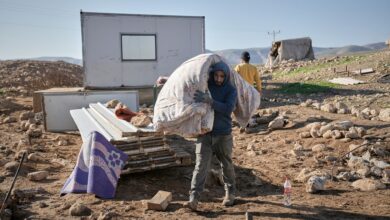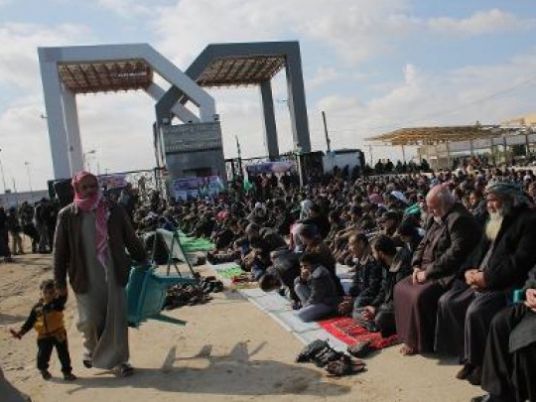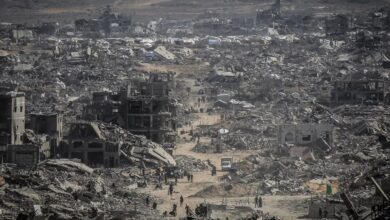Egyptian newspapers focus much of their Thursday, September 2 coverage on the five-party Middle East peace talks taking place in Washington under the auspices of US President Barack Obama, with Egyptian President Hosni Mubarak, Israeli Prime Minister Benjamin Netanyahu, Palestinian President Mahmoud Abbas, and Jordan's King Abdallah in attendance.
The largest headlines on the front page of the state-owned Al-Ahram read “Mubarak: I am telling the Israelis to seize the opportunity and extend your hands in peace,” along with “Settlements will neither establish rights for Israel, nor will they help it realize peace and security.” These headlines are paraphrased announcements from Mubarak's speech at the peace talks, which he delivered in Arabic.
Smaller headlines in Al-Ahram mention that Mubarak spoke, at the official Ramadan breakfast table in the White House, about how “Egypt will remain by the side of the Palestinians until the establishment of their independent state, with its capital being East Jerusalem.”
Meanwhile the chief headline on the front-page of the state-owned Al-Akhbar mentions Mubarak's ambitions: “We anticipate negotiations which are conclusive and decisive, leading to a peace agreement within one year.” A sub-header reads “Failure in realizing a just peace is no longer acceptable or plausible.”
Also on its front page news Al-Akhbar is an article about the latest meeting of the council of ministers, held under the leadership of Prime Minister Ahmed Nazif “in line with Mubarak's presidential program.” This article mentions the council of ministers' plans to conserve electricity, decrease pressure on electricity grids, and safeguard museums, in light of the recent theft of van Gogh's Poppy Flowers painting from the Mahmoud Khalil Museum in Cairo.
Also pertaining to Egypt's electricity needs, Al-Ahram has a front page news article about the country's nuclear ambitions. The article mentions how Egypt is working towards a nuclear safety and radiation agreement, expected to be concluded by September 16. The paper quotes Electricity Minister Hassan Younis who mentions that an international public tender would be announced for the establishment of Egypt's first nuclear reactor, with an agreement expected for the commencement of construction efforts by November.
As for chief headlines of the independent Al-Shorouk newspaper, they read: “President Mubarak in an article to the New York Times.” The paper paraphrases the Egyptian President's words in his op-ed piece with the headline: “The biggest obstacle that now stands in the way of success is psychological: the cumulative effect of years of violence and the expansion of Israeli settlements have led to a collapse of trust on both sides.” Another paraphrased headline reads “Egypt believes that the presence of an international force in the West Bank, to be stationed for a period to be agreed upon by the parties, could give both sides the confidence and security they seek.”
Al-Shorouk also provides coverage of the foreign ministerial meeting in Washington, under the auspices of US Secretary of State Hillary Clinton, in which Egyptian Foreign Minister Ahmed Abul Gheit announced, according to the paper, “Egypt supports America's efforts, and all efforts which assist Syria in regaining its Golan Heights.”
Unlike the state-owned papers, Al-Shorouk provides front-page coverage of questions and debates from members of the Carnegie Institute. “Peace and Mubarak's successor under scrutiny in America… What is presently taking place in Egypt is more important than peace talks,” a headline reads.
As for the independent daily Al-Dostor, its largest front-page headline reads “Congress pressures Obama to make use of Mubarak's presence in America to demand the realization of democracy prior to the presidential elections.” The paper paraphrases a segment of Mubarak's Op-ed piece in the New York Times regarding how Arab states should continue to demonstrate the seriousness of their peace initiative “with steps that address the hopes and concerns of ordinary Israelis.”
A sub-header reads: “American overlooks peace negotiations and asks Mubarak: Is hereditary presidential succession a reality? And when will democracy be realized in Egypt.” This frontpage article discusses how US journalists and newspapers seemed more concerned with Mubarak's domestic politics than with his regional peace-making overtures.




